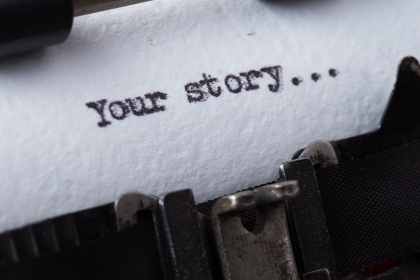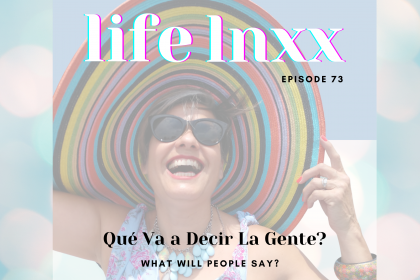Diversity is Knowledge
Diversity is not skin color. Diversity is a different way of thinking, a different set of beliefs and soulful alliance, a different approach to relationships… all of which are needed to continually improve the system now in place so that more opportunities are within reach for everyone.
[Intro with Music]
Consuelo
December Welcome
Hola, hola chicas! Yes, a double hola
Welcome to December, day 1, after a glorious holiday weekend. I hope you had a fab time together with friends and family with friends and family and got a chance to relax and catch up. After last year being shut out, even with all the ups and downs, we still endured this. There was a lot to be grateful for.
Hopefully you had that Friday off and you could just relax and enjoy what you want to do a little. Really grateful fo you all. I just loved having the weekend to spend together and I’m thinking that, geez, it really helps having those four days off so you have time to listen to the podcast. There was a huge bump this week, and I really, really appreciate you taking the time, relaxing and listening and that something’s resonating..
Could it have been that special guest? I think you all loved her. I’m so excited. I would love to have more, literally we’d love to have more. Looking forward to things opening up and can have that in-person contact because like I said, the Latina in me definitely does not want sterility here in four walls, no people and only a monitor, not loving it.
Have You Strayed From Your Diverse Identity?
Today let’s consider how adversity creeps into diverse families partially due to the pressures of societal norms. It’s challenging to maintain a true identity of a culture different from the area one lives in. It gets even more difficult when parents try to assimilate their children into the society and that assimilation is in direct conflict with who they are. This can cause pain and confusion in kids and that pain can stay pulsing for a long time if it’s not addressed. And this is true for any pain experienced as a child.
By the time you are in your 30’ and 40’s, it’s good to revisit your childhood and try to lend an adult perspective to how you were feeling then as a little kid, so that you can make adjustments to go forward. I say this because often when pain happens, we tend to shrink from our souls and have our brains take over the decision making in order not to get hurt again. You know this. You felt this. You may be feeling this right now. But, our cultural complexity, our heritage and identity is rooted in our soul. Without our identity, our soul, making decisions, we risk losing our diverse identity completely.
The beauty in life is that there is always time to pause and reflect on who you are, if you are living true to yourself and how to bring back the parts of you that may have been silenced. But before this can happen, it’s necessary to reflect on your parents’ situation and have empathy, put yourself in their shoes, and see if you would have don’t it differently in their time, with their resources and societal barriers. Hopefully, you realize, they did the best they could with what they had. Now, it’s up to you to make adjustments and live true to who you are by embracing your heritage in confidence.
Why is this important? Because if we continue to follow the thought process of avoiding conflict by assimilating into the norms, we lose our diversity completely. By embracing the struggle of adversity from our diversity, we learn to persevere to preserve it. We learn to recognize adversity when we see it in society and correct it. And with that, we bring forward the life knowledge of those before us which hold the answer we need today.
Family Adversity Over Cultural Differences
If you’ve been listening for a while, you know, there’s a common thread that runs through a lot of my stories and a lot of these episodes relative to talking from a first-generation point of view, first-generation meaning I have a mother who comes from Peru and I was raised under a different set of parenting norms then most kids my age at the time.
I try to describe the difficulty of what it was like to be raised in that situation. And also my learning process of understanding where my parents were coming from and why that difficulty was created to begin with. It’s really healing and I encourage you to go through it in your lifetime.
The idea of personal adversity from my family due to the cultural differences really ramped up in high school. That is a difficult age to take on more adversity, especially within the home. The situation can become isolating for an adolescent who is trying to maintain their identity without support from others who can empathize.
I have a story of when the cultural differences really started clashing and you can listen to it on my Dirty Deets bonus episode, this coming Monday, December 6. ‘The Dirty Deets’ are the full personal story that fuels any of the published episodes. The whole point isn’t just my story, but rather giving context to your life in this current day, a gauge for the change we need to improve our lives. You can compare your story to my story and get a feel of whether change is occurring quickly, or it really needs to pick up a bit.
The Struggle Of Raising First Generation American Children
There’s three different doors you could pass through in general when it comes to being a parent from a foreign country, and then what you are raising your children to do. That’s the first generation American.
There’s the come here and try to totally assimilate, blend in, through and through and raise your kids like that. Leave all your culture behind, leave all your language and your lifestyle and your love of your country. You’ve left behind, which I can’t even imagine. That would be heartbreaking to me.
Or, you could be all the way on the opposite end, which is yes, come here, live in America and find other people that are familiar and from your country and culture and heritage, so that you can blend back into that group. That’s comfortable. And not follow the American way, not follow the pop culture and stay as you were in that country, living here in America, those morals, those rules, and raise your kids like that, which is also very difficult.
And then there’s somewhere in the middle. And I feel like I fall somewhere in the middle where my mother, being from Peru, raised me to be very much, half, half very much. Yes. Here’s the American way. Here’s the opportunity. Here’s what you can do here. Strive to be successful in the American standard.
But at the same time, she transferred over to me all of her life story and all the knowledge of her family and her upbringing. And it says though, I got passed over the key to the vault. And in that held all of the life links, all of the knowledge from what she had learned, what her mother had taught her, what her mother was like and all of the family.
And also her cultural standards, all the rules and morals. And expectations of what a young woman was to act like, which were not only countries apart, but generations apart. And so there’s a very big gap. There’s this large chasm that separates these two halves, which was really easy to fall into, like a rabbit hole.
It’s really hard to navigate the two, hopping back and forth between ‘I can do this as an American, but I can’t do this as a daughter of a Peruvian’.
It’s a blessing, but it is very heavy. It’s a lot to carry.
Double Standards Built Into Society
Double standards are built into this society from the start and they continue even now, just look at the pay inequity between men and women. At least today, with more transparency and ability to share information, using a double standard is diminishing. But in my lifetime, it was prevalent even as society began to accept women in career positions.
There was a commercial for Enjoli, a perfume product in the 70’s, that literally showed a woman in business attire coming home, throwing her briefcase down, putting on an apron and grabbing a frying pan. The jingle went like this, “I can put the clothes on the line, feed the kids, get dresses, pass out the kisses and still get to work by 5 of 9. I can bring home the bacon, fry it up in a pan, and never, never, never let you forget you’re a man. Cuz I’m a woman…”
Yeah. That. That’s what I was raised in. That’s what my peers were learning a woman should be like. Now, we all can laugh at the audacity of the presumption and advertising model of what a woman was supposed to be at that time. But that type of commercial, and the double standard used in raising children then, have created 2 generations of men that believe this to be true, even today. And the danger is that it could easily become 3 if we don’t eliminate it from our societal identity.
So, it wasn’t a far stretch for my mother to adopt this into her parenting style. Remember, she became really worried about how I could assimilate into a culture that had been so harsh to her. So, if the commercials were saying an American woman should learn how to do it all, “and never never never forget you’re a man”, then she took it to heart.
Examples of Double Standards
The double standard was prevalent since I was the only daughter. To this day, I don’t really understand it. I’m still confused by the concept that a matriarch, a woman in charge of both family and corporation, would want to raise a daughter to be viewed as inferior to her sons. The only reason that makes sense to me is that the same matriarch was creating the males to blend into American culture and she needed help doing it. She knew no other way than what she experienced first-hand and what she was learning from those around her.
My mother would insist that I clean the all-boys bathroom and iron my father’s shirts. Any of you that have had to clean that, you have to wonder how there could be so many misses? Definitely not carnival winners.
But at the same time, I had to strive to be academically superior to them. The pressure was put on me to academically perform so they could bring home the CS and the DS. And yup, let’s go all the way to the bottom. But if I did, I was going to be grounded. That was punishment. So, in some sense, she was preparing me to be both a matriarch with career opportunities and someone’s wife, based on the 50’s model.
But, I didn’t accept this as the norm. I stood back to understand why she wanted me to do this. My mother did not foresee the power that the next generations of women would garner here in America. She was more focused on her own generational experience in this country. So, in case career opportunities would still be limited in my lifetime, she wanted to make sure I could“get a man”. Women should know how to cook, clean and praise men away from their self-doubt in order not to be alone because being alone, being an unmarried woman, was even lesser. This is the generational thinking.
In that regard, I think we should all be feeling really good about ourselves and our position in society that this is not a governing thought process anymore.
And yet, my mother probably realized that my personality would not be suitable for just being someone’s wife. I had too much vivacity and independence to rely on others for my livelihood. My bathroom cleaning skills were not going to be my strongest attraction.
Adversity Becomes Second Nature
By the time I was out of college, I was very tempted to lean more towards the American way of living. My mother was still imposing her cultural ideas and fears of me being too “free” in society. She told me it was great that I was the first and only female engineer at work but if I were to go out with the men after work, that would be a stain on the family image. I could earn my own living and have my own apartment but if I were to have my boyfriend over, that would be another stain on the family image.
After the severity of an engineering degree and the intensity of being the only woman, I needed some levity and freedom to lighten my load. I wanted to experience life with the same spontaneity and independence that my girlfriends were enjoying. But to do so would mean severing a relationship with my mother because she would have seen that as an act of disrespect.
I could not stay on one side or the other of this cultural chasm. One side would drive me crazy and the other would make me an orphan. I had to keep hopping from one side to the other in the hopes that I would not fall into the rabbit hole. It was exhausting.
I could have done without being a little war torn by the time I was 21. What I didn’t realize then was how prepared I was to face these same behaviors in the workplace and society. My reaction to this had become second nature and I no longer felt the struggle. So when it happened outside my home, my reaction was more like a reflex in addressing the double standard.
I remember the instant I faced the double standard at work when I found out that a new hire, a male hire, with less experience was given a higher salary. Had I not gone through a lifetime of being raised in a double standard, I doubt I would have acted so swiftly or so directly to call out the bias. After a lifetime of dealing with double standard at home, I knew it when I saw it. And, I wasn’t going to tolerate it.
I reflect back on this often to refresh my take on it. If I hadn’t stayed within my mother’s sphere of cultural influence, I would not have learned what a double standard or a cultural barrier felt like. If I had opted to blend in, to be the Connie, I would have dismissed my mother’s behaviors as cultural hiccups for being Hispanic, something that I didn’t have to worry about. And, in doing so, I would have had to dismiss her completely. You can’t pick and choose what you will take from a person you love. You have to love all of them and try to understand the parts that rub you the wrong way.
Adversity from the Start
There’s something about facing adversity within your own family that makes you better prepared for it in society. In my opinion, my identity wasn’t targeted by my family. It felt less personal. It felt more like a challenge. It was a safe place to challenge the norm even though the sideways consequences, the quote/unquote failures were viewed under a much finer microscope. It was tough to come back to the raised eyebrow suggesting an “I told you so”.
Being challenged by society on the other hand. In cultural barriers in double standards. To me that felt personal, that felt like, okay, you’re attacking my identity.
So in a way, this is such a big blessing being trained in your family of what this feels like. It gives you a safe place to hone your skills in dealing with it. You stay in it, take that journey in it. Have the faith that you can carry on in this challenge.
You roll with this adversity to maintain your diversity.
Understanding Where Cultural Adversity Begins
Now the adversity that she was operating under was mostly based on fear but that fear is based in reality of the social barriers that my parents generation were operating within and had no hopes of it changing. I did the same thing. Although I had battled against the barriers in the engineering field, I saw it as a long standing archaic industry with a misogynist lead. I did not encourage my daughters to enter into engineering because I did not think it would change enough in their lifetime.
Also what I didn’t see coming was the entirely new industry of technology. And how within technology, there would be additional layers of heavy male dominance that I’m not sure I totally prepared my girls to deal with. We have a very cozy in our female trio.
And although I raised them to be independent and courageous and to fight their fears, they really didn’t have exposure to what this double standard and cultural barrier felt like in a personal sense. Only if they got in the range of my brothers, but we don’t go there in this podcast.
When you have to fight for something, whether it’s fight to keep it or fight to get it, you tend to appreciate it so much more. You have invested your energy and passion and life into that fight. It becomes personal, even if the main focus is on the greater good.
If you haven’t been on the opposite side of conflict, if you haven’t experienced injustice, then you don’t know to look for it or to see it when it’s happening right in front of you. This was the blessing, the universal gift of experiencing these behaviors from within my family and taking my fortitude outside into the world.
Although it made my life easier. That wasn’t my intent. I didn’t want any other women to experience what I was going through. Not in my family. But in society. And if I could do my little bit to cut back. That bias to call out the double standard as it was happening and to show people where the cultural barriers were. In what everyone else considered the norm. Then I felt fulfilled. And this was before I even had daughters. I kind of feel like now I understand why I had daughters.
Nurturing Diversity Into the Future
They say that humanity has a tendency to lose information within three generations. I can see how many of you know, your great grandparents, their names, how they viewed life, their successes and struggles. That, that is the loss by the third generation. Especially if they have come from another country, maybe left family behind and so you don’t have contact with other family members that can tell you the full story.
This is how I honed my own way of carrying on the values of my heritage into the modern day of American culture. My daughters and their husbands cook our favorite Peruvian dishes. They know the stories of their great grandmother and how it compares to their current day. My daughters can recognize the resemblance to the women of our last 3 generations and can pass them on to the 5th and 6th generations in a first person account.
If you know the stories firsthand, then you can reliably pass them down two more generations.
This is what I view as diversity.
We cannot lose our identity. We will lose our heritage. We will lose our culture. We will lose what makes sense to us because it’s not just a place. It’s a feeling that pulses within us. It’s running in our blood and in our brain. In how we view life. It’s how we act in life.
So yes, you will feel adversity in your diversity but then you can use that to your advantage in understanding the system you will live and work within. You too have honed your strengths and convictions to not lay down your torch but rather to pass it onto the next generation.
What is the point of diversity if we lose our culture, lose our heritage and blend in to what is already the norm. Diversity is not skin color. Diversity is a different way of thinking, a different set of beliefs and soulful alliance, a different approach to relationships… all of which are needed to continually improve the system now in place so that more opportunities are within reach for everyone.
To lose diversity because it is too difficult to deal with adversity makes it feel like we shouldn’t be fighting for diversity at all.
This is the long game, ladies. We are the vessels for carrying our heritage intact as we live forward and sharing our stories with our family and friends so that context is built into our society. Diversity shall be seen as knowledge rather than a hand out, or a quota or even, equity.
Diversity is empowerment.
Step into your truth, ladies. Ciao!
[Outro with music]




